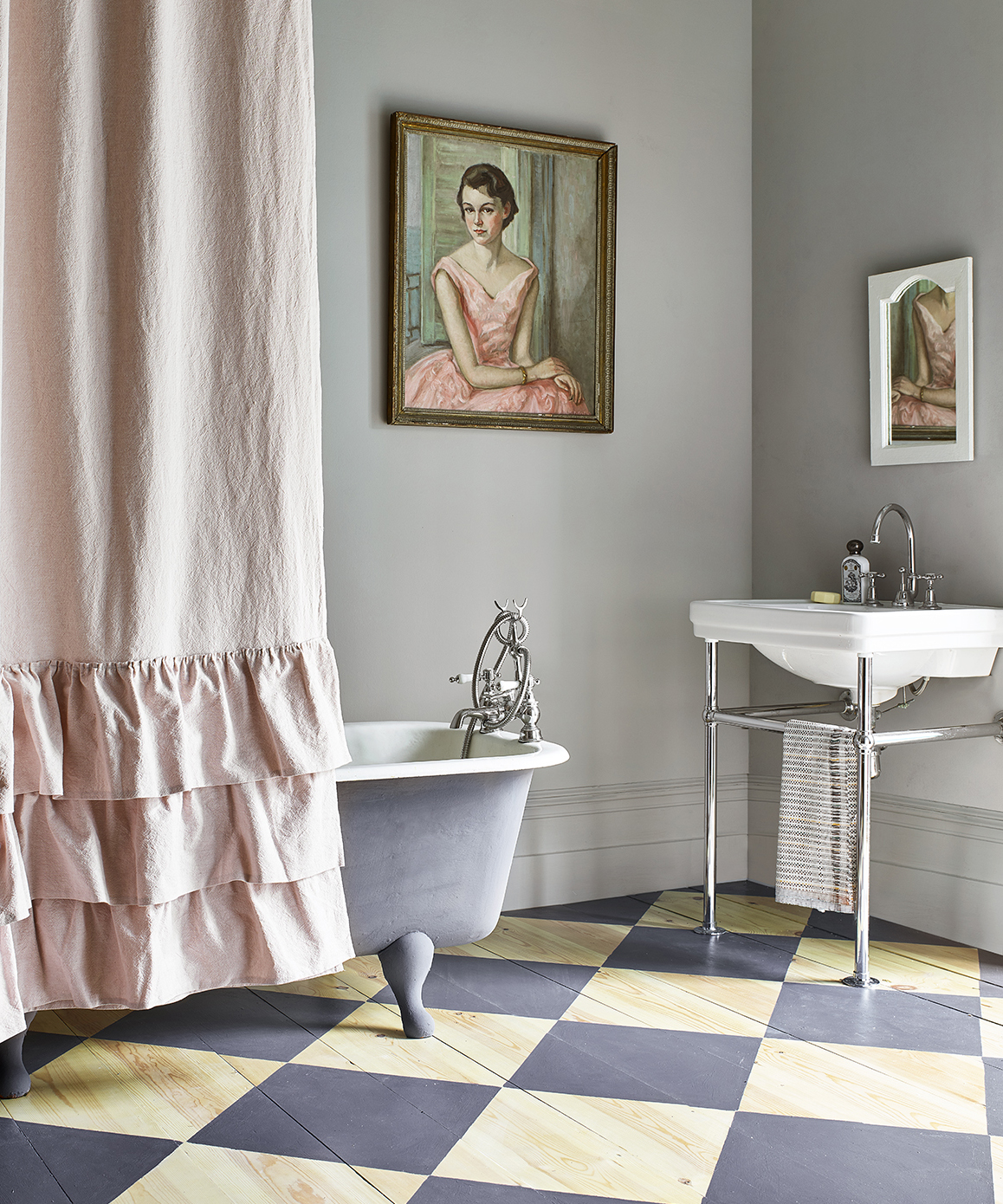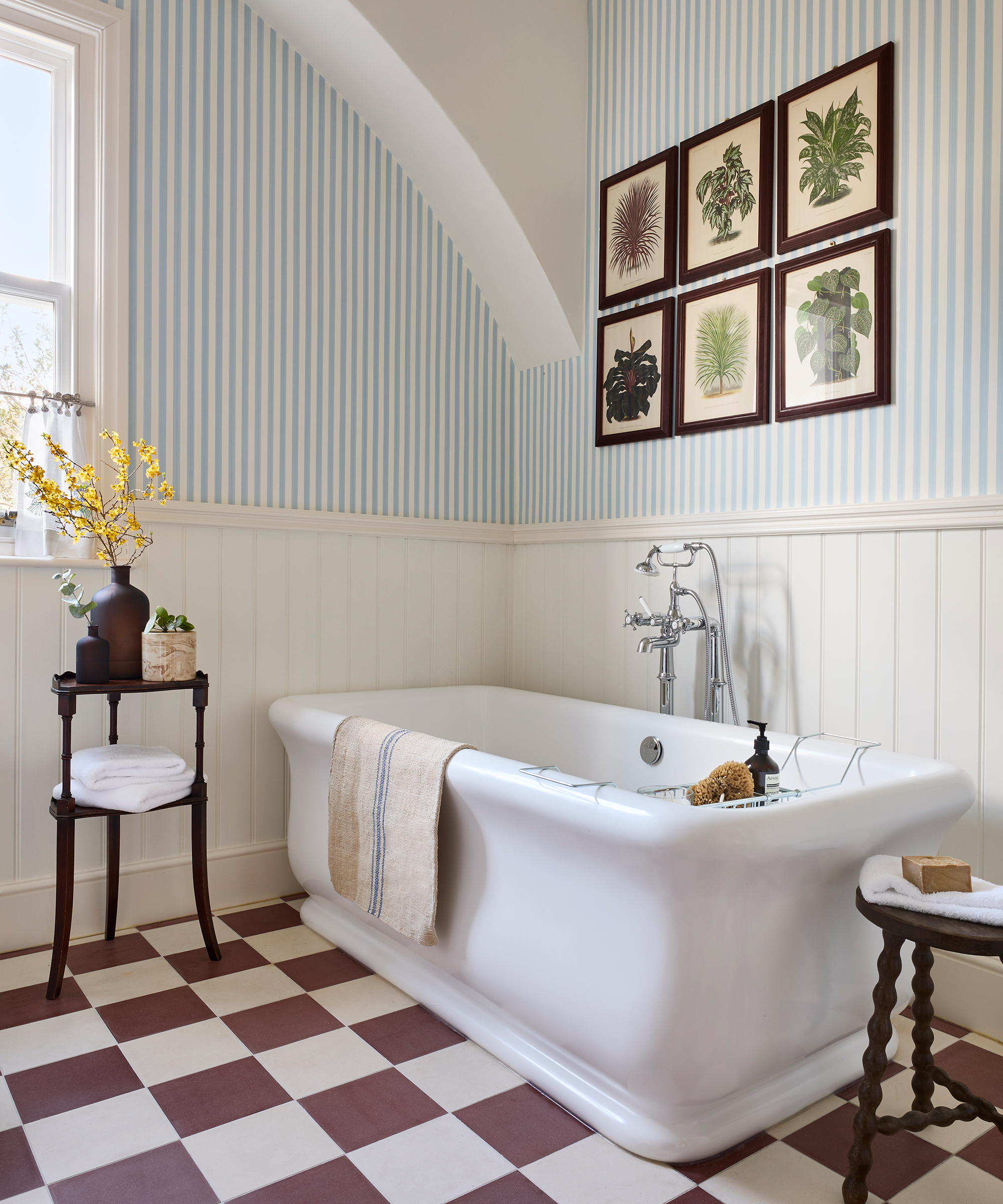How to paint checkerboard floors to create a smart, fashionable finish
Fed up with your floor? Then try an on-trend checkerboard finish to add classic style and elegance to a room


Do you want to know how to paint classic checkerboard floors? Then you’ve come to the right place. Here, we guide you through the process of giving wood flooring an on-trend checkerboard finish.
It's a straightforward DIY project that will add a stylish and distinctive finish to any room. You can go with the classic black-and-white color combo or stray from the standard. Why not try a dark blue and a light gray on your bathroom flooring or a light gray and dark gray in your hallway?
And it's not just the colors you can play with. If you want something slightly different to the timeless straight checkerboard finish, try a diamond pattern to add a twist that will ooze and style and class.
The tools you’ll need

Make sure you have the following tools ready to go before you start:
- Masking tape
- Electric sander
- Pencil
- Paintbrush
- Roller and tray
- Paint
- Wood filler
- Filling knife
- Floor tile (to use to mark outline of checkerboard pattern)
Step-by-step guide

With the right tools sorted you're ready to go. Here we guide you through all the steps you need to know to transform your wooden floor with a cool, contemporary look.
1. Prepare the floor
Start by emptying the room. A floor will need to be clear for at least a day or two, so store any furniture out of the way. Check there are no nails, staples or screws sticking up. If there are remove or hammer down so flush with the floor. If there are any loose boards, nail or screw down so they are secure.
Check the floor for any gouges, screw or nail holes and fill with a decent wood filler like this Red Oak Hardwood Wood Filler from Amazon. Leave to dry and rub down the whole floor with an electric hand sander. If you have a large floor space to sand, consider hiring a floor sander to get the job done.
2. Add a primer
Before you add any paint make sure to vacuum and clean to ensure the floor is free from dust and grease. If you have sanded the floor and have bare wood the first coat should be a primer like this Zinsser High Hide Cover Stain Primer and Sealer from Amazon. This helps adhesion and will stop any stains spoiling the top coats.
Start painting from one corner and use a paintbrush to create a three-inch border around the edge of the room before using a 9-inch short pile roller on an extension pole to apply the primer to the entire floor. Remember to start in the corner furthest away from the door and work towards the door, so you don’t get stuck in the middle of the room with no way out until the paint dries.
Design expertise in your inbox – from inspiring decorating ideas and beautiful celebrity homes to practical gardening advice and shopping round-ups.
3. Paint your base coat
When the primer is dry (if using one) check the surface and give it a light rub down with a fine 240 grit sandpaper if needed. Now add the base coat - this will be the lightest of the two colors.
Now follow the same process as the primer - start around the edges - and then work towards the door with a roller or paint pad. Leave to dry - again check the surface and see if it needs a sand - and add a second coat.
4. Choose your pattern and mark out
There is a choice of two patterns: straight and diamond. If you have straight walls the straight pattern is a good choice. For less than straight walls, or you want something different try the diamond pattern.
For ease of use, use a peel and stick tile to work out the pattern. To get an even pattern start in the middle of the room and measure in all directions to make sure there is an equal distance to the wall. Alternatively, start in one corner and work out across the floor. This will give you whole checkboards where you start, but might give half checkerboards at the opposite walls.
Once you have decided on your pattern and start point, lay down a peel and stick tile and draw around it with a pencil. Now use a long straight edge and mark out lines to the walls. Use the tile to help fill out the rest of the pattern.
Once the pattern is in place, get a good masking tape like this Scotch Painter's Tape from Walmart and place it on the outside of the lines where you are going to paint. Be warned, this may take a while and involve cutting to get neat lines.
5. Add the top coat
Now it's time to add the darker color paint in the masked squares to get the classic checkerboard pattern. Start in the corner farthest from the door and use a 2-inch brush to add paint on the edges and then use a mini roller to complete each checkerboard.
Remove the tape paint before the paint dries completely. Do it in sections so you don’t have to keep going back over recently painted areas.
If using a clear sealer, wait for the top coat to dry and apply across the whole of the floor in the same way that you added the base coat.
FAQs

What is the best type of paint for wooden floors?
Ideally you want to be using a durable, hard-wearing paint that is suitable for floors like this Rust-Oleum Home Interior Floor Coating Kit from Amazon. This includes a colored paint which is applied first, and a clear paint that you can put on top to protect the previous coat.
But you can use other paints that work on wood such as this Glidden Porch & Floor paint from Walmart. This is hard wearing, washable, waterproof and slip resistant.
Dennis Fiorilli, Director of Product Excellence at Sherwin-Williams recommends Sherwin Williams Porch & Floor Enamel, “This coating is designed for high traffic areas and provides excellent block and dirt resistance. It also has great washability, meets a low-slip rating required by the Americans with Disabilities Act, and is easily cleaned with soap and water.”
Alternatively, if you can’t find a color you want, you can use any wood paint covered with a clear sealer, but this may not last as long, so is better suited to low traffic areas.
What color combinations work well on checkerboard floors?
The classic combination for checkerboard floors is black and white, with gray and white, and gray and black being alternative options. You don't have to stick to the classics, you can choose any colors you want, but the classics do work well with a host of color schemes. One tip I would suggest is to make sure that you use contrasting colors to display the full effect of the checkerboard design.
How long do painted floors last?
This isn’t a simple question to answer as it will depend on a host of factors as Fiorilli reveals, “How long a painted floor lasts will really depend on the amount of traffic the floor is exposed to.” It could be a year in high traffic areas like a hallway, while it could be five years in a bedroom. To prolong the life of a floor, Fiorilli recommends, “Doing proper prep – clean, dull, dry – and choosing a quality floor coating will help extend the life of the coating.”
How can you hide seams when painting plywood floors?
Plywood sheeting is a popular choice for floors, but like any boards they often have a seam that can be seen when painted. But, hiding seams isn’t easy as Fiorilli explains, 'Hiding seams can be tough since the floors are likely to continue to expand and contract throughout the different seasons. Any type of wood filler used is likely to crack and fall out over time.' He continues, 'I would suggest letting the plywood be as it is and use it as part of the design.'
But if exposed seams aren’t to your liking, you can use painters caulk/sealant to fill any gaps. This is flexible and paintable, but ideally should only be used on small gaps. And, dependent on floor movement and conditions it might need to be replaced every few years.
The classic checkerboard pattern is an excellent small bathroom flooring idea and is an equally timeless choice for kitchen floors, too.

Steve has been a homes writer and editor for two decades, regularly contributing to brands like Homebuilding & Renovating Magazine. He is an avid DIYer with over 20 years of experience transforming and renovating homes. He specializes in painting and decorating but has strong all-around building skills, having worked in the industry for ten years.